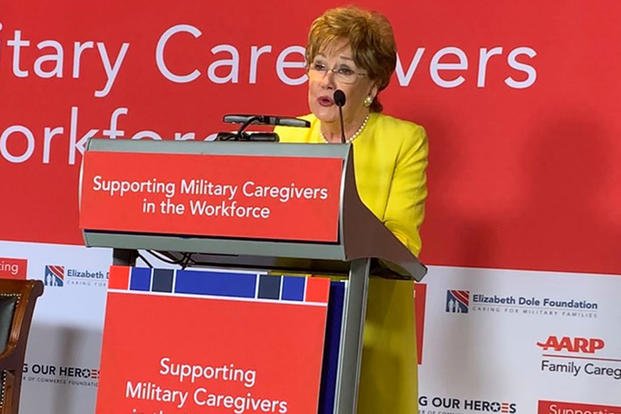Two new projects aim to make employment easier for what their creators said is an often-overlooked group: military veteran caregivers.
A new 38-page booklet is designed to serve as a "practical guide" for employers who want to support caregivers in the workplace. And officials with the U.S. Chamber of Commerce Foundation announced 20 new spots in its corporate fellowship program specifically earmarked for veteran caregivers.
The fellowship expansion and the new booklet, which was produced by the Elizabeth Dole Foundation, AARP and the Chamber, were announced Tuesday at an event in Washington, D.C.
Caregivers "didn't sign up to serve, yet they dropped everything to care for their wounded warrior and to provide a voluntary service to their country," former Sen. Elizabeth Dole said during the event. "In many cases, however, these caregivers must also continue to work, as they are also the sole breadwinner of the family. Serving as a military caregiver should not be a barrier to employment or to success in the workplace but, for too many, it is."
Related: Sesame Street Launches New Campaign for Caregivers and Families
Unlike the unemployment and underemployment rates among military spouses, which have been tracked over time, data has never been gathered on the issue among veteran caregivers. But officials with the Dole Foundation said they've heard from caregivers that finding and keeping work that offers enough flexibility and is understanding of gaps in their employment history can be a major challenge.
"They are balancing multiple wounds, illnesses and injuries at home, and many of them skew younger, especially the post-9/11 cohort, so they're in their prime earning years. That means they need a job, and they've got to deliver income to the family," Steve Schwab, who leads the Dole Foundation, said during the event. "The challenges are varied and diverse."
Also, caregivers often don't self-identify as such to prospective employers because they fear their home situation will be misunderstood, he said. That makes it even harder for employers to offer appropriate support.
"There still is widespread lack of awareness across the country about the situation facing families at home, and that means caregivers are very often reluctant to self-identify. ... These are not individuals who often raise their hand and ask for help," Schwab said. "So it's up to us ... to increase the likelihood that they are going to self-identify."
Teaching employers how to work with caregivers while also giving caregivers a shot at gathering work experience is why programs like the Chamber's corporate fellowship are important, said Eric Eversole, who leads the Chamber Foundation's Hiring Our Heroes program.
Like an internship, the fellowship helps participants burnish their resumes and gain an understanding of whether they are the right fit for the company or industry. And while employment with the host company isn't guaranteed at the conclusion of the fellowship, Eversole said more than 60% of their fellows get a job at the end, and over 80% are offered one.
The 6-week fellowships include on-the-job experience with a company with weekly classroom sessions, according to the Chamber's website.
Caregiver fellowships are available now in San Antonio and Fort Hood, Texas; the National Capital Region; and Colorado Springs, Colorado. Next year, San Diego, California; Tampa and Orlando, Florida; Dallas, Texas; Tacoma, Washington; and Hawaii will join the list, Eversole said.
Caregivers can apply for the fellowship on the Chamber's website.
The employer help booklet was assembled through a public-private partnership task force with more than 20 members. The group, which first met in June, included government officials from the Department of Homeland Security and the Pentagon, as well as officials from companies such as Bank of America and Amazon.
Organizers said the book aims to help businesses better understand what caregivers might need to be successful in the workplace, including tips like offering flexible work hours and hosting networking lunches for caregivers in the company, said Jennifer Mackinday, who works on caregiver issues with the Wounded Warrior Project.
"These challenges and ideas came straight from the military and veteran caregiver task force," she said. "And they provide steps that any employer can take to be a part of this nationwide initiative to make meaningful employment possible for every caregiver that needs it."
But supporting caregivers in the workplace isn't just a veteran spouse issue, organizers noted at the event. More than 40 million Americans have served as caregivers for a loved one, making the 5.5 million veteran-affiliated caregivers just a part of a much larger workforce issue, they said.
By creating a guidebook focused on best practices for the smaller group, they said they hope to make changes that can benefit everyone.
-- Amy Bushatz can be reached at amy.bushatz@military.com.
This story was updated Sept. 13 to clarify the duration of the fellowship program.
Read more: The Air Force Just Dropped 80,000 Pounds of Bombs on Island 'Infested' with ISIS Fighters













